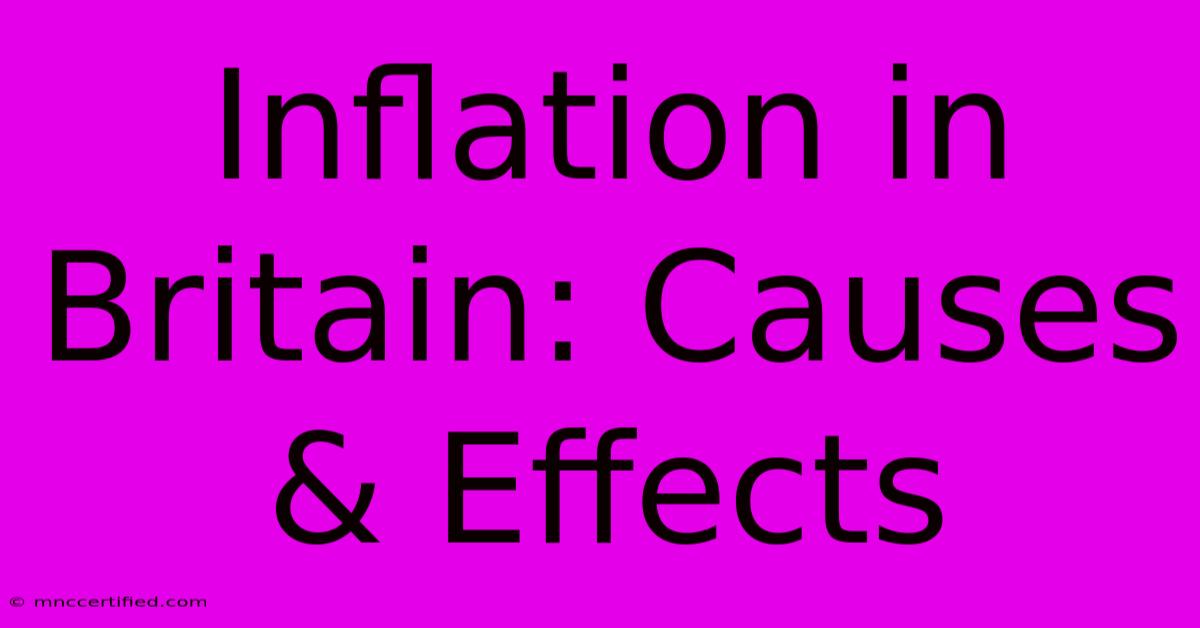Inflation In Britain: Causes & Effects

Table of Contents
Inflation in Britain: Causes & Effects
Britain, like many other nations, has been grappling with rising inflation in recent years. Understanding the causes and effects of this economic phenomenon is crucial for individuals, businesses, and policymakers alike. This article delves into the complexities of inflation in Britain, exploring its underlying drivers and its wide-ranging consequences.
Understanding Inflation
Inflation, simply put, is a sustained increase in the general price level of goods and services in an economy over a period of time. When the price level rises, each unit of currency buys fewer goods and services. Consequently, inflation reflects a reduction in the purchasing power per unit of money – a loss of real value in the medium of exchange and unit of account within the economy. In Britain, inflation is typically measured using the Consumer Price Index (CPI) and the Retail Price Index (RPI).
Measuring Inflation in the UK
The Consumer Prices Index (CPI) is the UK's most widely used measure of inflation. It tracks the average change in the prices paid by consumers for a basket of goods and services. The Retail Prices Index (RPI), while less favoured by the government, includes housing costs (mortgage interest payments and council tax) which CPI excludes, providing a potentially broader picture of inflationary pressures felt by households. Understanding the difference between these indices is important for accurately interpreting inflation data.
Causes of Inflation in Britain
Several factors contribute to inflationary pressures in the UK economy. These can be broadly categorized as:
1. Demand-Pull Inflation:
This occurs when aggregate demand (total spending in the economy) outstrips aggregate supply (the total amount of goods and services produced). Increased consumer spending, government expenditure, or investment can push prices higher as businesses respond to increased demand. A booming economy, fueled by factors like low interest rates or increased consumer confidence, can contribute to demand-pull inflation.
2. Cost-Push Inflation:
This type of inflation arises from increases in the cost of production. Rising wages, increased energy prices (like oil and gas), or higher import costs due to weaker exchange rates can lead businesses to pass on these increased costs to consumers through higher prices. The recent energy crisis in Europe has significantly contributed to cost-push inflation in Britain.
3. Built-in Inflation:
This relates to the expectations of future inflation. If workers expect prices to rise, they may demand higher wages, leading businesses to increase prices further to cover these increased labor costs. This creates a self-fulfilling prophecy, driving inflation higher. This is also known as a wage-price spiral.
4. Monetary Factors:
The money supply plays a crucial role in inflation. If the Bank of England increases the money supply too rapidly, it can lead to excess money chasing a limited amount of goods and services, pushing prices upwards. This is often linked to interest rate policies.
Effects of Inflation in Britain
High inflation has significant consequences across the British economy and its citizens:
1. Reduced Purchasing Power:
As prices rise, the purchasing power of consumers decreases. This means that individuals can afford to buy less with their income, potentially leading to a decline in their living standards.
2. Uncertainty and Investment:
High and volatile inflation creates uncertainty for businesses, making it difficult to plan for the future and potentially discouraging investment.
3. Increased Interest Rates:
To combat inflation, the Bank of England often raises interest rates. While this helps curb inflation, it also increases borrowing costs for individuals and businesses, potentially slowing down economic growth.
4. Income Inequality:
Inflation can disproportionately affect low-income households who spend a larger portion of their income on essential goods and services. These goods and services are often more sensitive to price changes.
5. Social Unrest:
Persistently high inflation can lead to social unrest and political instability, as people struggle with the rising cost of living.
Conclusion: Tackling Inflation in Britain
Managing inflation requires a multifaceted approach. The Bank of England uses monetary policy tools, primarily interest rate adjustments, to control inflation. Fiscal policy, managed by the government, can also play a role through measures like taxation and government spending. Understanding the complex interplay of these factors and their impact on the British economy is crucial for navigating the challenges presented by inflation. Staying informed about economic indicators and government policies is essential for individuals and businesses alike to effectively adapt to the changing economic landscape.

Thank you for visiting our website wich cover about Inflation In Britain: Causes & Effects. We hope the information provided has been useful to you. Feel free to contact us if you have any questions or need further assistance. See you next time and dont miss to bookmark.
Featured Posts
-
Guinness Supply Issues Wetherspoons Concerns
Dec 18, 2024
-
Aoc Loses Oversight Role To Connolly
Dec 18, 2024
-
Chiswick Rnli Real Heroes Rescue Dj
Dec 18, 2024
-
Hodgkinson Wins Sports Award 2024
Dec 18, 2024
-
Dog Saved Host Needs Rescue From Thames
Dec 18, 2024